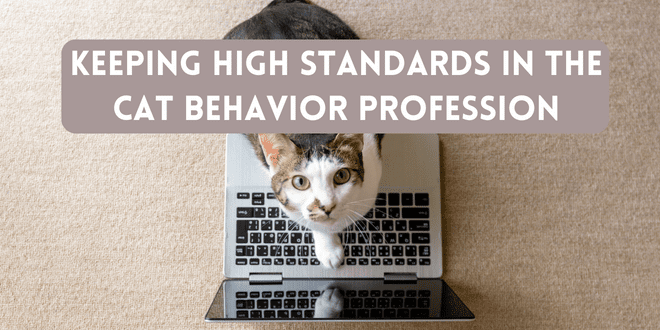
When your cat is displaying a behavior problem it’s a very stressful situation for the entire family. The human family members are impacted by whatever issue the cat is going through. I’ve seen cases where the cat’s behavior problem has caused serious tension between spouses and significant others. Cat parents can be brought to tears over the frustration of not knowing where to turn for help when kitty veers from the norm.
It’s Harder Than it Looks on TV
When it comes to being a professional in the cat behavior field, just because some people have had cats all their life or they were told they have a “way” with cats doesn’t make them cat behavior experts. It’s also not a quick road to fame and fortune, although some attempting to be in this field are motivated by the prospect of being famous. Being a cat behavior expert involves lots of time, dedication, and sacrifice. Yes, recent television made cat behavior consulting seem like an easy and trendy thing to do but REAL problems aren’t solved in an hour. I know because I had my own show on Animal Planet UK and I know how much follow-up most cases require. The television audience doesn’t get to see how much time is actually spent with clients. In my daily behavior business, my consultations include lengthy follow-up and that’s something you don’t see on TV.
Behavior problems range from the little pesky issues that annoy the family to the serious ones that can end up being a looming death sentence for the cat. When cat parents decide it’s time to call in a professional, the choice they make may create a happy ending or it may escalate the problem. Whenever I do public education seminars I always stress that when families look for professional cat behavior help, they must do their homework and look beyond the flashy websites and self-aggrandizing advertisements to make sure the person hired is truly a cat behavior expert.
When you look at a behavior expert, evaluate their qualifications beyond any too-good-to-be-true claims or website testimonials (many are false), and make sure you get a sense of their expertise, ethics, integrity, and honesty. The latter three points are certainly harder to access but as I’ve watched this profession become increasingly popular, I see some people exaggerating their experience, and credentials. I’ve even seen false education claims. Too many behavior “experts” are also claiming they can read cats and communicate on a special level with them. Sadly, it’s the cats who suffer because cat parents put their trust in people who are more interested in becoming famous and not in professionally doing the job for which they were hired.
If you are a professional in this field, please help keep the standards high and remember the goal is to make life better for cats. Remember, we are giving a voice to the animals who can’t speak. We are also often the last resort for families of cats with behavior issues. That’s a big responsibility and how you conduct yourself reflects on everyone in this profession. It’s also essential that you act professionally toward your peers. Sadly, I’ve been the victim of discrediting, envy, and plagiarism, and I’ve also seen it happen to colleagues. When I began my career in 1982 it was a quiet, lonely field. I watched as it grew and was happy to see more opportunities for cats to be helped but now I’m getting more calls from clients who have already been to unprofessional behavior consultants, so-called whisperers, and communicators and are now trying to undue the damage.
Finding Professional Help
Do your homework before hiring someone to help you with your cat’s behavior. Start with your veterinarian and get a qualified referral. Because the field of animal behavior is unregulated, there will be many opportunities for you to be taken advantage of. In the hands of an ethical, qualified professional though, you may have the opportunity to have the relationship with your cat you’ve always wanted.
Start with your veterinarian. Many times, there is an underlying medical cause for the behavior being displayed. Your veterinarian may also give you a referral to a certified behavior expert. Certified Applied Animal Behaviorists are certified through the Animal Behavior Society. Veterinary Behaviorists are certified through the American College of Veterinary Behaviorists. Certified Animal Behavior Consultants are certified through the International Association of Animal Behavior Consultants.
Need More Information?
For more information on cat behavior and training, refer to the best-selling books by Pam Johnson-Bennett. Pam’s books are available at bookstores and online. We’ve also included Amazon links here on our website.
If you have a question about your cat’s behavior or health, contact your veterinarian. If behavior work is advised, your veterinarian can refer you to a qualified behavior professional.
 Problem Solving & Advice by Pam Johnson-Bennett Cat Behavior Expert & Best-selling Author
Problem Solving & Advice by Pam Johnson-Bennett Cat Behavior Expert & Best-selling Author



